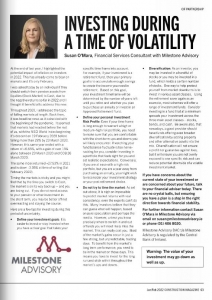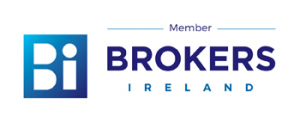In this month’s Construction Magazine, Susan offers some helpful tips for those investing during this period of uncertainty.
 At the end of last year, I highlighted the potential impact of inflation on investors in 2022. This has already come to bear on markets and it’s only February. I was asked today by an individual if they should switch their pension assets from Equities (Stock Market) to Cash, due to the negative returns so far in 2022 and I thought it beneficial to address this now.
At the end of last year, I highlighted the potential impact of inflation on investors in 2022. This has already come to bear on markets and it’s only February. I was asked today by an individual if they should switch their pension assets from Equities (Stock Market) to Cash, due to the negative returns so far in 2022 and I thought it beneficial to address this now.
Throughout 2020, I addressed the topic of falling markets at length. Back then, it was headline news as it coincided with the beginning of the pandemic. It seemed that markets had reacted before the rest of us, with the MSCI World Index beginning it’s descent on 19 February 2020 before falling more than 28% by 23 March 2020. However, this same year ended with a return of +6.65%, with a gain of over 13% alone between 23 March 2020 and COB 26 March 2020. The same index returned +27.53% in 2021 and is down -3.05% at time of writing (1st February 2022).
Timing the markets is tricky and you might find that by the time you switch to Cash, the market is on its way back up – and you are losing out. If you do not need access to your pension or other investment in the short term, you may be better off not overreacting and staying the course.
Here are a few tips for investing during this period of uncertainty.
 Define your investment goals: It is easier to invest or stay invested when you have a clear goal that takes your specific time frame into account. For example, if your investment is a retirement fund, then your primary goal is to accumulate enough savings to create the income you need in retirement. Based on this goal, your investment timeframe will be determined by the number of years left until you retire and whether you plan to purchase an annuity or invest in an Approved Retirement Fund.
Define your investment goals: It is easier to invest or stay invested when you have a clear goal that takes your specific time frame into account. For example, if your investment is a retirement fund, then your primary goal is to accumulate enough savings to create the income you need in retirement. Based on this goal, your investment timeframe will be determined by the number of years left until you retire and whether you plan to purchase an annuity or invest in an Approved Retirement Fund.- Define your personal Investment Risk Profile: Even if your time frame is long enough to warrant a high or medium-high risk portfolio, you need to make sure that you are comfortable with the short-term ups and downs you will likely encounter. If watching your fund balance fluctuate is too nerve-racking for you, consider investing in a portfolio that feels right for you and set realistic expectations. Conversely, if you are at ease with a high-risk portfolio, but you are a year away from purchasing an annuity, you might wish to reconsider your investment strategy or your post retirement choice.
- Do not try to time the market: As set out above, it is nigh on impossible to predict market returns with real consistency; even the experts can’t do this. Many investors believe that they can guess what will happen, based on pure speculation and perhaps the media. However, unless you know precisely when to switch in and out of funds you will most likely miss the market. This can really cost you. Most of the market’s gains occur in just a few strong, but unpredictable, trading days. To benefit from the market’s long term performance, you need to be in the market on those days. This means you have to invest for the long run and stick with it throughout the market’s ups and downs.
- Diversification: As an investor, you may be invested in a handful of stocks or you may be invested in a fund, which holds a certain number of stocks. One way to help protect yourself from market downturns is to invest in various asset classes. Using the retirement saver again as an example, most schemes will offer a range of investment funds. Consider investing in a fund that at a minimum spreads your investment across the three main asset classes—stocks, bonds, and cash. Be aware also, that nowadays, a good provider should have funds offering even broader diversification by adding property and other alternative assets into the mix. Diversification will not ensure a profit nor guarantee against loss, but it will ensure you are not overly exposed to one specific risk and can reduce potential downside of a volatile investment market.
What should you do now?
Consider the value of time on your money. Invest cash wisely, take an appropriate amount of investment risk in your pension, and inflation proof your savings, by investing them in funds rather than a low or no interest paying bank account.

Here to help you navigate your way to financial security.
For further information please contact Susan O’Mara via email or phone: (01) 406 8020.
Milestone Advisory DAC t/a Milestone Advisory is regulated by the Central Bank of Ireland.
Warning: The value of your investment may go down as well as up.
If you are concerned about the performance of your fund or investment, you should contact your financial adviser.





